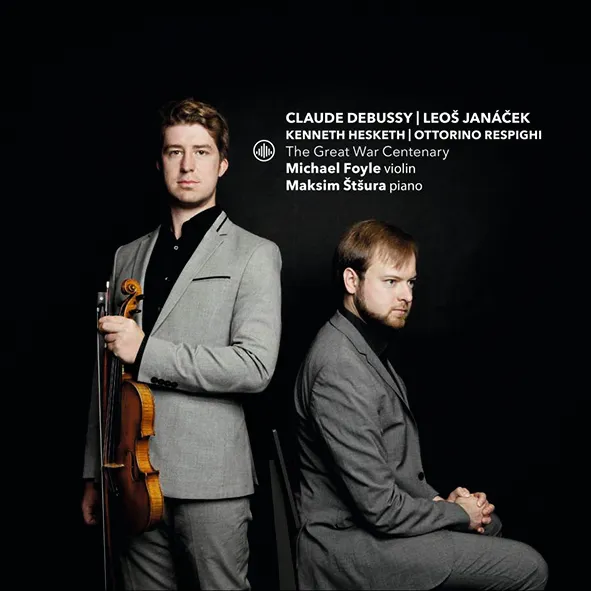
The Great War Centenary Debussy Violin Sonata; Hesketh Inscrizione (derivata); Janáček Violin Sonata; Respighi Violin Sonata Michael Foyle (violin), Maksim Štšura (piano) Challenge Classics CC72786 (hybrid CD/SACD) 66:04 mins
Warning: before you start listening, set the volume a notch or so lower than you usually would. Even by today’s standards, Michael Foyle’s violin-playing is on the big-toned side – a situation underlined by another frequent contemporary fixation, a needlessly close-recorded balance. The combined effect has an in-your-face quality which surely isn’t intended, and is solved by the equivalent of moving a few rows back, in what sounds like a likeably spacious listening ambience. Foyle’s and Štšura’s programme centres round three works each composed during the First World War – circumstances not directly reflected in the music itself, apart from Janáček’s Sonata to an extent. Kenneth Hesketh’s Inscrizione (derivata) – A Lie to the Dying was commissioned specially for this recital, and holds its own in such formidable company. Hesketh’s idiom, with its high violin harmonics and much interplay between the piano’s middling-high and very low registers, generates a sonic collage that’s vividly and beautifully conceived and executed.
Foyle’s playing is remarkable in its accuracy, tonal focus and impressive range of musical options: the violin’s opening phrase in Debussy’s Sonata sounds unusually clipped at a first hearing, but that’s how the composer notates it, and the work’s interplay of cool luminosity and melodic skittishness is deftly judged. Janáček’s magnificent Sonata requires, outside its haunting ‘Balada’ movement, a trenchant response from each performer, to which Štšura’s firm-toned piano-playing makes a fine contribution. Respighi’s Sonata occupies more standard late-Romantic territory, but is a substantial creation nonetheless, delivered by both artists in sweeping style.
Malcolm Hayes


